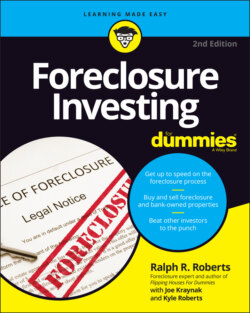Читать книгу Foreclosure Investing For Dummies - Ralph R. Roberts - Страница 72
Finding and buying government properties
ОглавлениеThe U.S. government sponsors several programs to encourage home ownership, including Department of Housing and Urban Development (HUD) and Department of Veterans Affairs (VA) financing. Often, borrowers default on these loans, and the government ends up with a property that it doesn’t need or want. In addition, state and local governments may seize properties for infrastructure improvements or as a result of unpaid taxes or criminal activities.
As a citizen, you have the right to purchase these government properties, and you can often pick them up at deep discounts. Following is a list of common resources for government-owned properties:
HUD and VA repos: When homeowners default on a HUD or VA home loan, like any lender, the government can choose to foreclose on the property. These deals aren’t always best for investors because HUD and VA homes are commonly listed at or just below market value, but by being persistent, you can often find some pretty good deals.
State department of transportation: The department of transportation commonly buys up property for road improvements and disposes of the property after completing the project.
State or county drug enforcement agency: If a homeowner is paying for a property with illicit funds, or if the house is home to criminal activity, the government may step in, take possession of the property, evict the homeowners, and sell the house.
County sheriff’s office: When your county sheriff’s office seizes a property, perhaps because it was purchased with proceeds from criminal activity, it may offer the property for sale through a broker or at auction.
A condominium association can also foreclose on a property to collect unpaid condominium fees. Remember, however, that a condo lien is just another lien. The senior lien (first mortgage) takes precedence.
